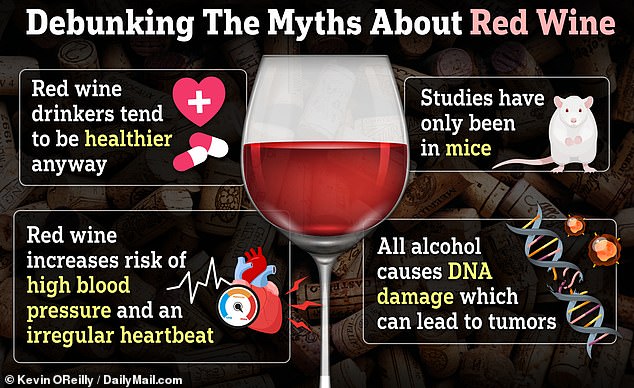You may have heard that a glass or two of red wine with dinner has heart health benefits.
However, leading experts are now debunking that myth and instead drawing connections between drinking and major health problems.
The idea that red wine improves heart health dates back to the 1980s.
A group of scientists noticed a phenomenon that became known as the French paradox: the curious fact that the French, who eat high-fat foods and drink red wine, have relatively low rates of heart disease, compared to other nations.
But experts have now refuted the purported benefits, saying the evidence supporting them is weak and has only been documented in observational studies, meaning other factors could be at play.
Dr. Leslie Cho, a cardiologist at the Cleveland Clinic, saying last week that red wine actually has no heart health benefits, adding, “It’s time to let go of that belief.”
According to Dr. Cho, there is no good evidence that wine is less harmful than other types of alcohol.
She says more recent studies, conducted in humans and animals, show that it can actually increase the risk of diseases like cancer and heart disease.

Experts have now refuted the purported benefits, stating that the evidence supporting them is weak and has only been documented in observational, not clinical, studies.
The French paradox and the inclusion of red wine in the heart-healthy Mediterranean diet were widely accepted by the public. In a short time it became a medical consensus and scientists still defend its benefits.
Red wine contains compounds called polyphenols, which are believed to help protect the lining of the heart’s blood vessels. One polyphenol in particular called resveratrol has received the most attention. However, research on its benefits has only been done in mice.
There is no evidence of any benefit for people taking resveratrol supplements. And you would have to drink between one hundred and one thousand glasses of red wine a day to obtain an amount equivalent to the doses that improved health in mice. according to Dr. Kenneth Mukamal, an internist at Harvard-affiliated Beth Israel Deaconess Medical Center.
Experts talking to The New York Times have questioned the validity of observational studies of supposed heart health benefits. When examining population data on wine consumption, there are factors that can complicate the analysis.
For example, people who consume red wine tend to maintain healthier diets and lifestyles, which may contribute to their overall well-being. This does not imply that red wine alone is responsible for the health benefits, but rather the lifestyle associated with red wine consumption.
Alternatively, researchers have suggested that the fact that “moderate” drinks reaped more benefits than non-drinkers could be attributed to the fact that a considerable portion of the “non-drinkers” were former drinkers who had stopped drinking alcohol due to health problems. of health.
Leading health authorities, including the World Health Organization, maintain that “no level of alcohol consumption is safe for our health.”
Dr Carina Ferreira-Borges, Regional Advisor on Alcohol and Illicit Drugs, WHO Regional Office for Europe, saying: ‘We cannot talk about the so-called safe level of alcohol consumption. It doesn’t matter how much you drink: the risk to the drinker’s health begins from the first drop of any alcoholic beverage. The only thing we can say for sure is that the more you drink, the more harmful it is or, in other words, the less you drink, the safer it is.’
It is also known that alcohol increase blood pressure, increasing the risk of heart disease. A 2023 study published in the journal Hypertension found that as people drank more alcohol, their blood pressure increased. This was true for systolic blood pressure (SBP) and diastolic blood pressure (DBP).
Drinking just one glass may also increase the risk of a type of heart arrhythmia known as atrial fibrillation, according to a 2021 report in the journal. Annals of internal medicine.
Alcohol can also increase a person’s ability. risk of developing cancer. When the body metabolizes alcohol, it produces acetaldehyde, a toxic compound that can damage DNA and cell proteins, causing mutations and the possible growth of cancer cells.
It can also increase estrogen levels in women, which has been linked to an increased risk of developing breast cancer and other hormone-related cancers.


